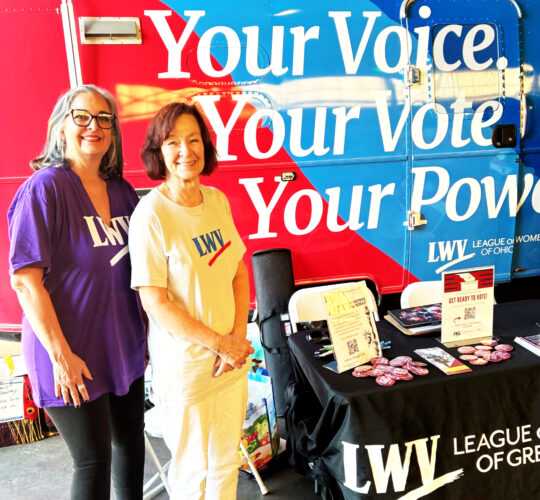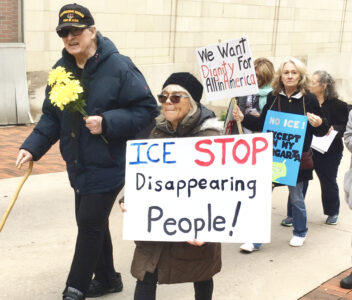League speaks out against district maps

Submitted photo
Lisa Lee Kohler, the League of Women Voters of Greater Youngstown’s president, left, and Kathie Gaige, the league’s second vice president, took part in a Youngstown Votes event early last month at Penguin City Brewing Co. in Youngstown. The two women also spoke at a gathering that the Youngstown branch of the American Association of University Women hosted Saturday at the Boardman branch of the Public Library of Youngstown and Mahoning County.
“It looks like it tilts the map in favor of Republicans, compared to the partisan lean of the state,” Kathie Gaige, the League of Women Voters of Greater Youngstown’s second vice president, said. “It was not done with transparency, and little opportunity for public input.”
The seven-member nonpartisan redistricting commission unveiled the map proposal Thursday before Friday’s deadline to redraw the map — and ahead of Tuesday’s general election. The map was introduced around 4 p.m. Thursday, then voted on during a meeting at 10 a.m. Friday, Gaige noted.
The map will be in place until after the 2030 census, when new lines are to be drawn.
The controversy was among the topics Gaige and Lisa Lee Kohler, the LWV’s president, covered during a gathering Saturday at the Boardman branch of the Public Library of Youngstown and Mahoning County on Glenwood Avenue.
The two-hour informational session aimed to spotlight some of the nonpartisan league’s top priorities, which are working to ensure fair elections, having “clean” money in elections and advocating for a healthier democracy.
Hosting the event was the Youngstown chapter of the American Association of University Women.
The new congressional map, which will take effect in 2026, splits several areas across Ohio, including Mahoning County and the Cincinnati area in Hamilton County. The latest move also comes after seven maps the redistricting commission had drawn were declared unconstitutional, Gaige said.
Nearly half of Mahoning County will be in the 14th District, which includes all of Trumbull and Ashtabula counties. The rest of the county will remain part of the 6th District, which encompasses Columbiana, Carroll, Tuscarawas, Belmont, Harrison and Jefferson counties, along with portions of Stark, Wayne and Holmes counties. Both districts are considered to be Republican strongholds.
The Ohio Redistricting Commission is made up of five Republicans, including Gov. Mike DeWine, Auditor Keith Faber and Secretary of State Frank LaRose, and two Democrats. The other four members are Sen. Jane M. Timken, former Ohio Republican Party chairwoman; Dani Isaacsohn, House minority leader; Nickie J. Antonio, Senate minority leader co-chairwoman; and Brian Stewart, representative co-chairman.
Beforehand, voters in 2015 and 2018 approved reforms to create districts “that are compact, consist of communities of shared interests, avoid splitting natural communities, and produce a statewide map that reflects the partisan lean of the state,” Gaige explained.
The often insidious and harmful effects of gerrymandering districts include making many elected officials more beholden and accountable to donors and party affiliations than to their constituents, creating elections that are unfairly noncompetitive and allowing more seats to be won by the party in power than the overall vote reflects, she noted.
“We have never lived in a country where those with political power easily give it up,” Gaige said.
During her presentation Saturday, Gaige also sharply criticized what she said was intentionally misleading and confusing language in state Issue 1, which Ohio voters rejected in the November 2024 election. The proposed amendment to the state constitution was purported to limit partisan gerrymandering, yet included the word “requires” regarding the practice, she noted.
“A lot of people were saying, ‘We’re confused! We’re confused by Issue 1.’ Did you all hear that? Confusion means we don’t know, so we did our job. Confusing Ohioans was not such a bad strategy,” Alex Triantafilou, the Ohio Republican Party chairman, said during a special event Sandusky County Republicans held in Fremont earlier this year.
Calling it “a partner of gerrymandering,” Gaige added that “dark money” often has an unfair and corrosive effect on elections largely because it’s contributed in an oblique manner and the public typically is unaware of who is behind it.
WHAT CAN BE DONE
Kohler advised attendees Saturday to contact their elected officials, especially at the state level, in a consistent and friendly way. Over time, congressional staffers who address constituents’ concerns will get to know those who reach out regularly, she said.
Voters also can monitor online a slew of pending bills as well as those under consideration by visiting https://ohiobills.wtf, a Google app that is updated weekly and briefly describes what each piece of legislation is intended to do. Other websites to access for staying informed about the General Assembly’s actions include www.legislature.ohio.gov and www.theohiochannel.org, she noted.
In her remarks, Kohler also cited several pieces of pending legislation, including Ohio House Bill 233, the so-called “Ohio SAVE Act” that would require documentary proof of citizenship to register to vote, eliminate drop boxes for ballots and require exact-match identification for all voting. In addition, the measure would overload local boards of elections with unnecessary burdens without proper funding, threaten voter drives and make it more difficult to petition the government, Kohler said.
She also mentioned legislation such as Senate Bill 82, which is aimed at further protecting election officials’ safety by shielding their information from public records requests.
Kohler and Gaige also encouraged their audience to provide in-person or written testimony during committee hearings and follow organizations that are fighting for the same things they are.
To be most effective, such testimony should be “short and sweet” and about two to three minutes, they said.
The most important way for people to work toward combating gerrymandering and defeating bills that are contrary to a strong, vibrant democracy is to make their voices heard, Kohler and Gaige added.
“It’s up to us as intelligent, educated and informed women to make some noise,” Kohler said, adding, “The last thing we need to do is to be meek and mild and not make noise.” “The takeaway? It’s better not to let elected officials control the map-making process,” Gaige said.

